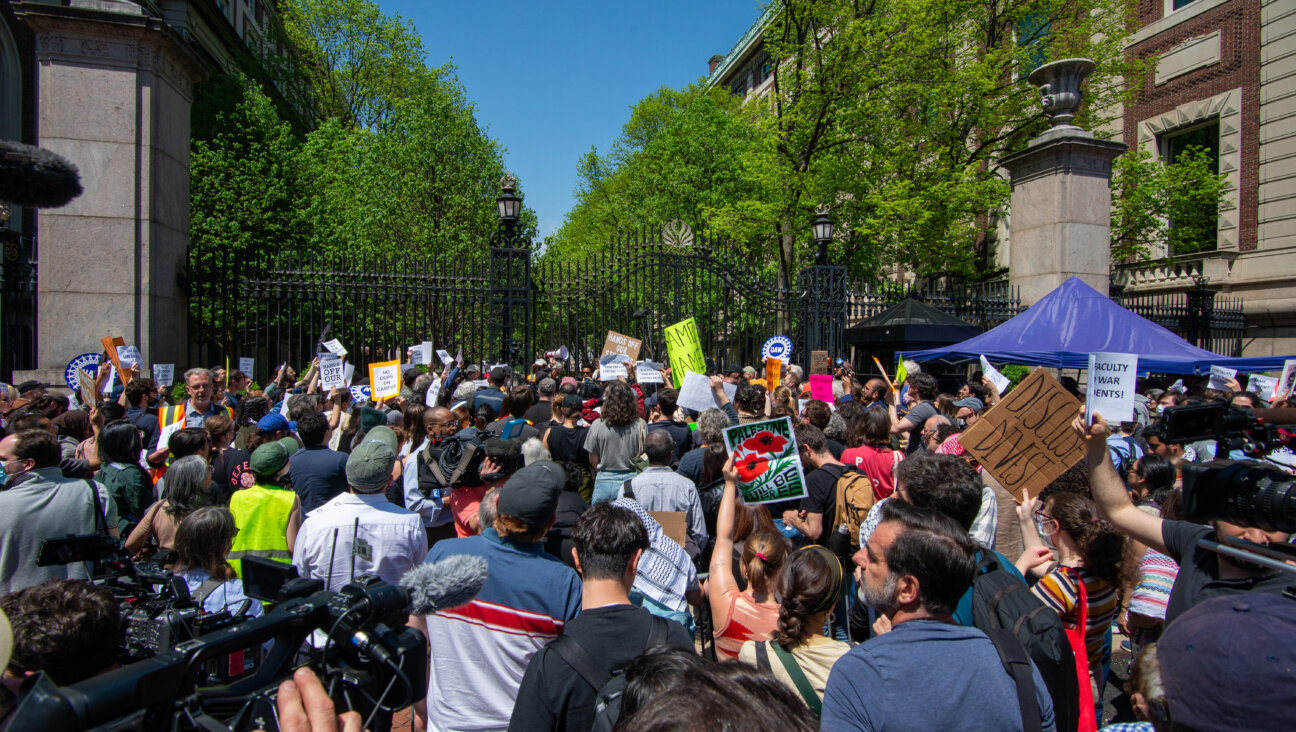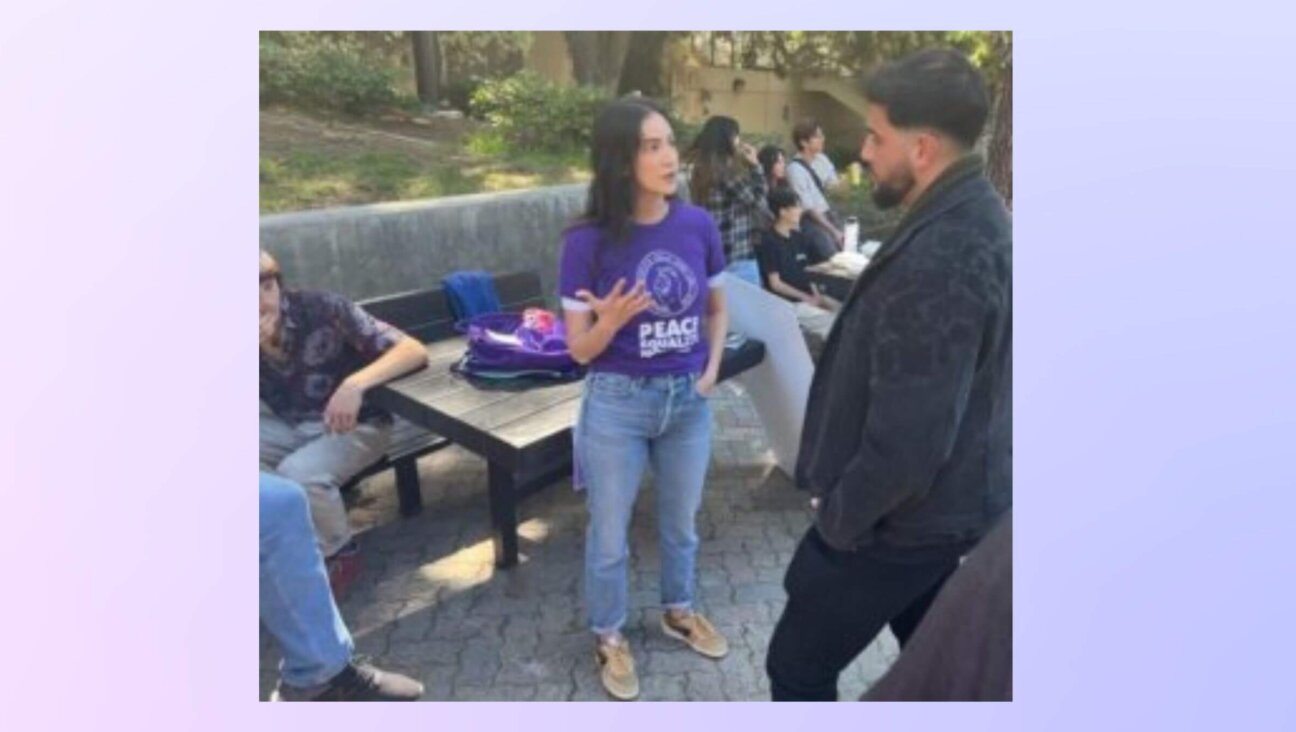Theater charity Broadway Cares will support relief for Israelis after fielding complaints about funding Gaza aid

Posters advertise Broadway musicals outside the Richard Rodgers Theatre near Times Square in New York on September 14, 2021. (Photo by ED JONES/AFP via Getty Images)
(New York Jewish Week) — The philanthropic organization Broadway Cares said it would allocate funds to Israeli civilians in need after a New York rabbi filed a complaint against the theater charity for contributing to Gaza relief efforts.
In a statement to the New York Jewish Week, the nonprofit also acknowledged that it had “created confusion among our valued supporters.” The group vowed to provide more information about where it was allocating the money it raised.
“Transparency is of the utmost importance to us,” read the statement by Tom Viola, executive director of Broadway Cares/Equity Fights AIDS. “We are actively updating our in-theater fundraising communications with shows to ensure clarity regarding the breadth of where donations are directed.”
Broadway Cares is the flagship charity of the theater world, and is often introduced at Broadway shows following the curtain call, when stars will appeal to their audiences to make a donation into a trademark red bucket as they exit the theater. Those fundraising pitches, which happen in the spring and fall, typically focus on the organization’s core mission: funding HIV/AIDS treatment as well as health care for underemployed actors.
“This wonderful organization helps provide social services and safety nets for people in our industry — onstage, backstage — who are going through tough times,” went a typical pitch, made at the end of a November showing of “Back to the Future” on Broadway. “And in addition to that, [it] provides millions of dollars in grants every year to other social services and safety nets such as food banks, women’s health initiatives and natural disaster relief.”
Rabbi Erica Gerson recalls hearing a version of that pitch when she attended a performance of “Harry Potter and the Cursed Child” last year, following Hamas’ Oct. 7 attack on Israel. The pitch did not mention any international funding, she said, and she gave a small cash donation.
But last month, she was surprised to see that in addition to funding health care and social services, the charity also announced that it had allocated $400,000 to humanitarian groups working in Gaza — $200,000 each to Doctors of the World and the International Rescue Committee. The announcement made no mention of Israel.
The allocation announcement came as international aid groups have said Gaza is at risk of famine and warned that much of its population is underfed. The Broadway Cares announcement said the funding would go toward “food, water, fuel, quality health care, essential medicines and supplies to all caught in the tragedy of this conflict and so many families facing catastrophe.”
Gerson, a philanthropist whose giving also focuses on health care and emergency aid internationally, called the Gaza donations a “misrepresentation” of the Broadway Cares’ stated goals. She was particularly concerned in light of reports that Hamas has seized aid meant for civilians.
“This is just completely unrelated to what they tell audience members and I felt taken advantage of,” Gerson told the New York Jewish Week. “I have taken them over the years at their word and I was therefore shocked.”
On Feb. 10, Gerson filed a complaint with New York Attorney General Letitia James’ office, saying she was “entirely misled by both the verbal pitch at the theater and the description on the website.” The New York Jewish Week has learned that James’ office is reviewing the complaint.
The Gaza donations have also drawn the attention of the right-wing Zionist Organization of America, which raised the issue with Viola in early January, said Susan Tuchman, the director of ZOA’s Center for Law and Justice.
Tuchman said ZOA took issue with the donations partly because the two aid organizations, Doctors of the World and the International Rescue Committee, do not work in Israel, despite working elsewhere in the Middle East, according to their websites. Tuchman also objected to the IRC’s statement on Oct. 7, amid Hamas’ attack, which did not mention the terror group and said the group was “dismayed by the dramatic escalation of violence and mourn the extensive loss of civilian life in Israel and Gaza today.”
Tuchman also requested that Broadway Cares direct funds to Israelis affected by the Hamas massacre, and be more transparent with audiences.
“Simply telling audiences that their donations are going toward helping individuals battling HIV/AIDS and other serious health concerns is not accurate,” Tuchman told Viola in an email exchange she shared with the New York Jewish Week.
In response to the complaints, Viola told the New York Jewish Week on Tuesday that the organization will fund aid to Israeli civilians along with the Gaza allocations.
“Our humanitarian aid supports human need and doesn’t follow a political agenda,” Viola said in the statement, adding later, “Broadway Cares will soon be announcing a commitment to direct funds to organizations providing lifesaving aid to Israeli civilians impacted by this conflict.”
Viola added that the group regularly directs a portion of its funding to those affected by natural disasters and humanitarian crises around the world. In 2023, he said, Broadway Cares awarded $17.2 million in grants, including $600,000 for disaster relief in the U.S. and Turkey. In 2022, the group also donated $300,000 to humanitarian relief in Ukraine.
Tuchman had called for Broadway Cares to donate to Israeli causes, and said she hoped it would give as much to aid Israeli civilians as it had to groups providing relief in Gaza.
“We look forward to Broadway Cares finally donating funds that will go directly to helping the many Israelis who’ve endured so much suffering and loss,” Tuchman said. “We hope and expect that Broadway Cares will be as generous as it was to the two groups providing aid in Gaza.”
This article originally appeared on JTA.org.

I hope you appreciated this article. Before you go, I’d like to ask you to please support the Forward’s award-winning, nonprofit journalism during this critical time.
Now more than ever, American Jews need independent news they can trust, with reporting driven by truth, not ideology. We serve you, not any ideological agenda.
At a time when other newsrooms are closing or cutting back, the Forward has removed its paywall and invested additional resources to report on the ground from Israel and around the U.S. on the impact of the war, rising antisemitism and the protests on college campuses.
Readers like you make it all possible. Support our work by becoming a Forward Member and connect with our journalism and your community.
Make a gift of any size and become a Forward member today. You’ll support our mission to tell the American Jewish story fully and fairly.
— Rachel Fishman Feddersen, Publisher and CEO
Join our mission to tell the Jewish story fully and fairly.





















